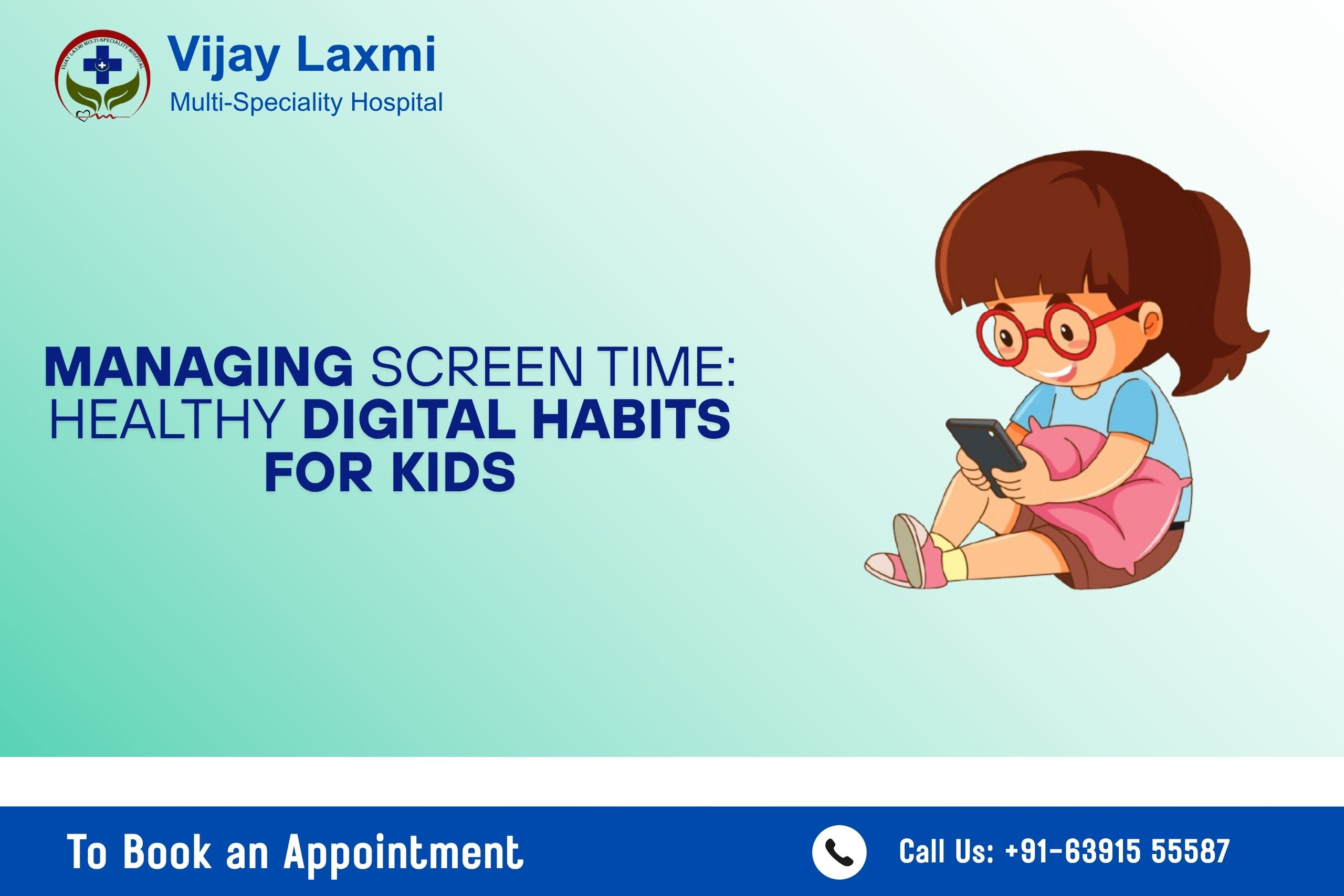
Managing Screen Time: Healthy Digital Habits for Kids
The Growing Concern About Screen Time Effects on Kids
In today’s digital age, screens are everywhere from televisions and tablets to smartphones and laptops. For children, technology has become both a source of learning and entertainment. But as devices become a bigger part of childhood, many parents are left wondering: How much screen time is too much?
Excessive screen exposure has been linked to various behavioral, physical, and emotional issues in children. Understanding the screen time effects on kids helps parents make informed decisions that promote healthier, more balanced routines.
At Vijay Laxmi Multi-Speciality Hospital, Jaunpur, Dr. Gunjan Patel, best pediatrician, emphasizes the importance of setting clear digital boundaries early in life. Technology can be a powerful tool for learning, she explains, but without structure, it can easily interfere with a child’s development, sleep, and social growth.
This guide will help you understand the impact of screen time on kids and how to cultivate healthy digital habits at home.
Understanding Screen Time: What Counts and What Doesn’t
Screen time isn’t inherently bad, it’s about how and how much it’s used.
According to the American Academy of Pediatrics (AAP), screen time includes any activity involving a digital screen — such as watching TV, playing video games, scrolling social media, or using a smartphone or tablet.
However, not all screen time is created equal:
- Passive Screen Time: Watching videos or television without interaction.
- Interactive Screen Time: Educational games, video calls, and creative activities like digital drawing.
- Social Screen Time: Communicating through messaging or video chats.
Understanding this distinction helps parents choose activities that support development rather than hinder it.
The Real Screen Time Effects on Kids
1. Impact on Brain Development
Excessive exposure to fast-paced, high-stimulation content can alter how a child’s brain processes information. Research suggests that overuse may affect attention span, impulse control, and problem-solving abilities.
Children under 5 are particularly sensitive because their brains are still developing neural connections. Constant screen exposure may delay language and social skills development.
Dr. Gunjan Patel often reminds parents that “the human brain learns best through real-life interaction, play, and conversation, not passive digital input.”
2. Emotional and Behavioral Changes
Too much screen time has been associated with irritability, anxiety, and difficulty managing emotions. Kids who spend several hours online daily often show signs of restlessness when devices are taken away, a phenomenon similar to withdrawal.
Moreover, exposure to violent or unrealistic media can distort their understanding of relationships, empathy, and problem-solving.
Tip: Encourage empathy-building activities offline, like role-playing, storytelling, and cooperative games.
3. Physical Health Concerns
The physical effects of screen time on kids are becoming increasingly evident. Sedentary screen habits contribute to poor posture, eye strain, obesity, and even sleep disturbances.
- Blue light exposure disrupts the body’s natural sleep cycle (circadian rhythm).
- Poor posture can lead to back or neck pain even in young children.
- Reduced outdoor playtime impacts bone strength and cardiovascular health.
According to Dr. Patel, “Children need at least one hour of active physical play every day to balance the time they spend on screens.”
4. Sleep Disruption
Screens emit blue light, which suppresses melatonin — the hormone responsible for regulating sleep. When kids use devices before bedtime, it becomes harder for them to fall asleep and stay asleep.
This leads to daytime fatigue, poor concentration, and mood swings.
To combat this, Dr. Patel advises parents to create a “digital sunset” — turning off all devices at least one hour before bedtime to help the brain wind down naturally.
5. Academic and Learning Challenges
While digital tools can enhance education, unregulated screen use can hinder academic progress. Children who multitask between schoolwork and digital entertainment may struggle to focus and retain information.
Passive media consumption also reduces curiosity and creativity, which are crucial for learning.
Smart Screen Tip: Co-watch educational programs with your child. Discuss what they’re learning to boost comprehension and critical thinking.
How Much Screen Time Is Healthy?
Here’s what the American Academy of Pediatrics (AAP) recommends:
- Under 18 months: Avoid screens except for video calls.
- 18–24 months: Introduce only high-quality educational content with parental guidance.
- 2–5 years: Limit to 1 hour per day of supervised screen use.
- 6 years and older: Maintain consistent limits on screen use, ensuring it doesn’t replace physical activity, sleep, or family time.
However, each family’s situation is unique. Dr. Gunjan Patel recommends parents consider both the quantity and quality of screen time.
Building Healthy Digital Habits for Kids
Here are proven strategies to help manage the screen time effects on kids while promoting healthier tech habits.
1. Create a Family Media Plan
Set clear guidelines for when, where, and how screens are used. For example:
- No phones during meals or family time.
- Designate “tech-free zones” like bedrooms.
- Encourage device-free outdoor play.
2. Lead by Example
Children mirror adult behavior. If parents are constantly scrolling through phones, kids will follow suit. Make it a family goal to unplug together read, cook, or go for a walk instead of watching TV after dinner.
3. Prioritize Quality Content
Choose apps and shows that foster learning, creativity, and emotional growth. Platforms like PBS Kids, National Geographic Kids, or Khan Academy Kids offer age-appropriate educational content.
Helpful resource: https://www.healthychildren.org — AAP’s parent-friendly guide on media use.
4. Encourage Outdoor and Offline Activities
Replace screen time with hands-on play sports, art, music, or reading. Physical activity enhances brain health, social skills, and mood regulation.
Dr. Gunjan Patel often advises parents to “balance the virtual world with the real one because every hour spent outdoors builds a stronger, healthier child.”
5. Monitor and Discuss Screen Use
Instead of banning devices, have open discussions about what your child watches or plays. Ask questions like:
- “What did you learn from that game?”
- “How did that video make you feel?”
This helps children build media literacy and become mindful users rather than passive consumers.
Managing Screen Time Effects on Kids: Role of Parents and Doctors
Parents play a crucial role in modeling balanced tech behavior, but pediatricians also help guide families toward healthier digital habits.
At Vijay Laxmi Multi-Speciality Hospital, Dr. Gunjan Patel offers comprehensive counseling for parents struggling to set limits on screen time. Her approach includes:
- Assessing a child’s physical and emotional health
- Recommending personalized media schedules
- Guiding families on alternative learning and play methods
“Screens aren’t the enemy,” says Dr. Patel, “but like sugar, they should be enjoyed in moderation.”
Natural Remedies to Counter Screen Time Effects
While screen time management requires structure and awareness, natural remedies can help reduce its negative effects on kids’ health:
- Eye Health Support: Encourage the 20-20-20 rule — every 20 minutes, look at something 20 feet away for 20 seconds.
- Outdoor Exposure: Sunlight helps regulate melatonin and reduces myopia (nearsightedness).
- Balanced Nutrition: Include foods rich in vitamin A, lutein, omega-3s, and antioxidants for better eye and brain health.
- Mindfulness Practices: Introduce breathing exercises, yoga, or meditation for emotional balance.
- Sleep Hygiene: Turn off all screens an hour before bedtime; replace with storytelling or relaxing music.
When to Seek Professional Help
If your child exhibits symptoms like:
- Trouble focusing or socializing
- Mood swings or aggressive behavior
- Poor sleep or eye strain
…it may be time to consult a pediatrician.
Dr. Gunjan Patel at Vijay Laxmi Multi-Speciality Hospital, Jaunpur, helps families address these challenges through early assessment, counseling, and behavioral guidance tailored to each child’s needs.
Balance, Not Ban
Technology is here to stay and it’s not the enemy. The key lies in balance. By setting boundaries, promoting real-world play, and being mindful of the screen time effects on kids, parents can ensure their children grow up healthy, confident, and emotionally strong.
As Dr. Gunjan Patel wisely says,
“The goal isn’t to eliminate screens, it’s to teach kids how to live well with them.”
So start today: turn off the screens, go for a walk, and reconnect as a family because childhood deserves more real moments than digital ones.
If you’re worried about your child’s screen habits or behavioral changes, professional guidance can make all the difference.
Visit Dr. Gunjan Patel at Vijay Laxmi Multi-Speciality Hospital, Jaunpur, for expert advice on child development, digital wellness, and balanced parenting.
Call Us: 063915 55587
Visit Us: Laxmi Complex, Jaycees Chauraha, Azamgarh Rd, Pratap Colony, Jaunpur, Uttar Pradesh 222002
Disclaimer:
The information provided in this article is for educational and informational purposes only and is not a substitute for professional medical advice, diagnosis, or treatment. Always consult a qualified healthcare provider











